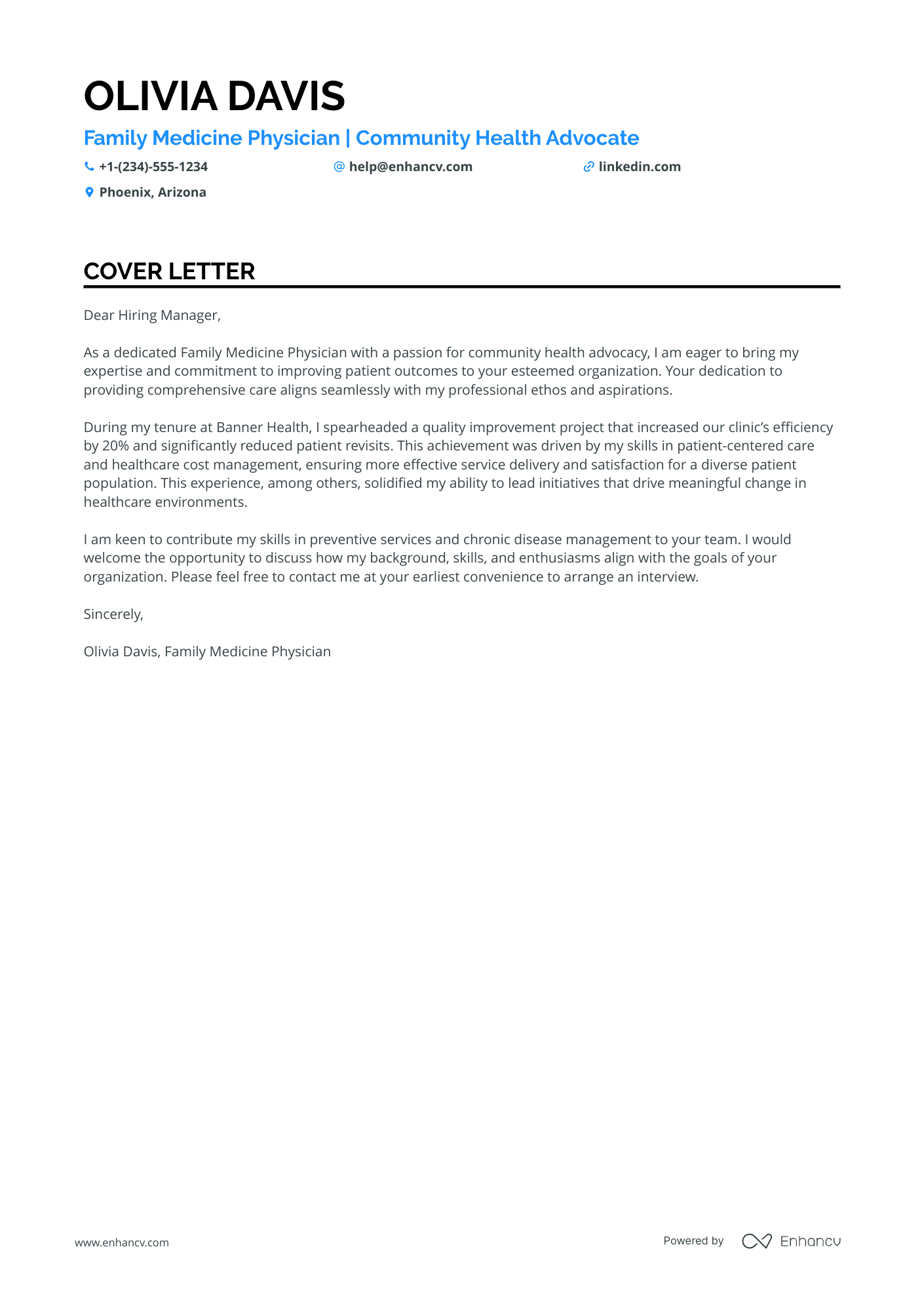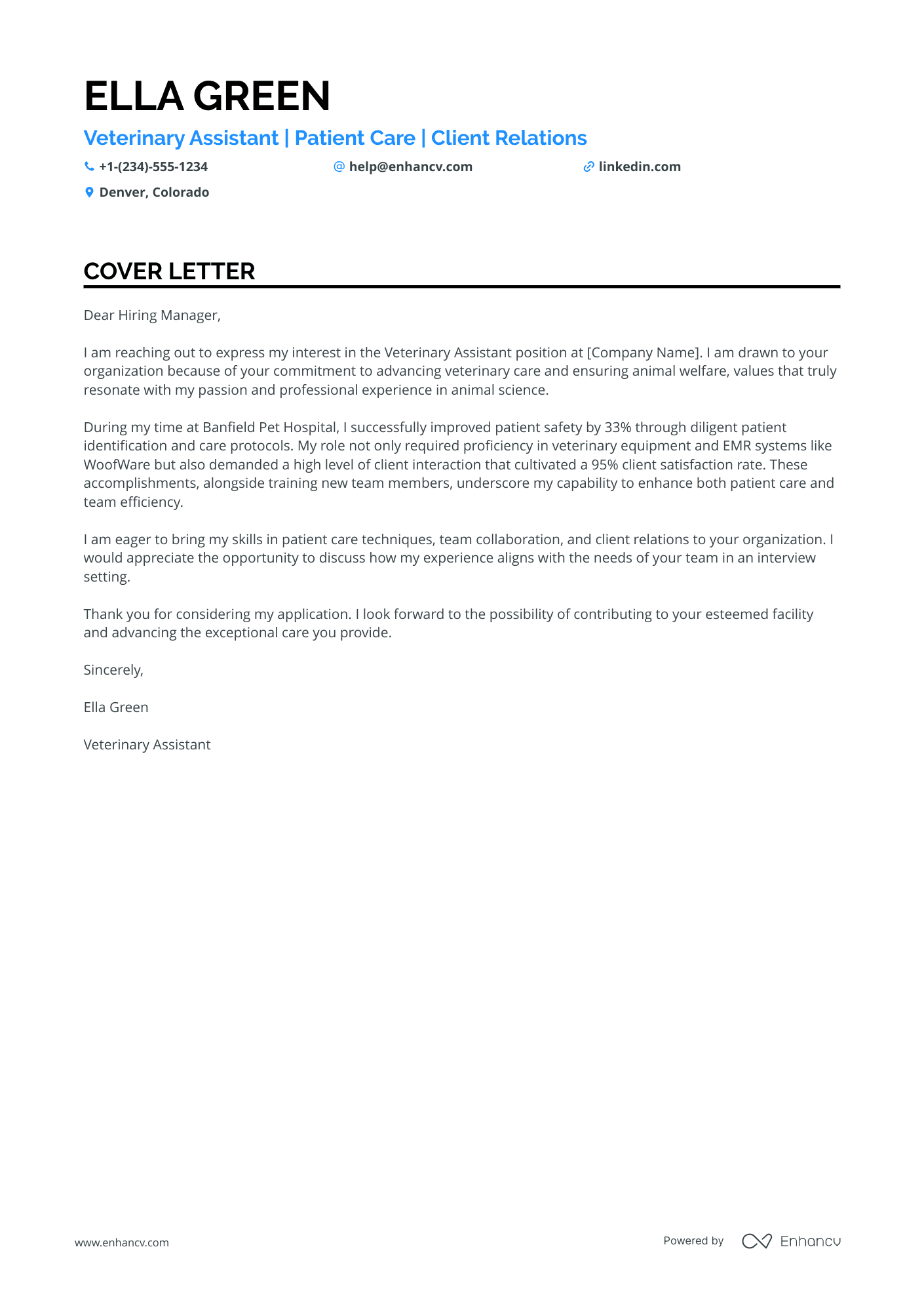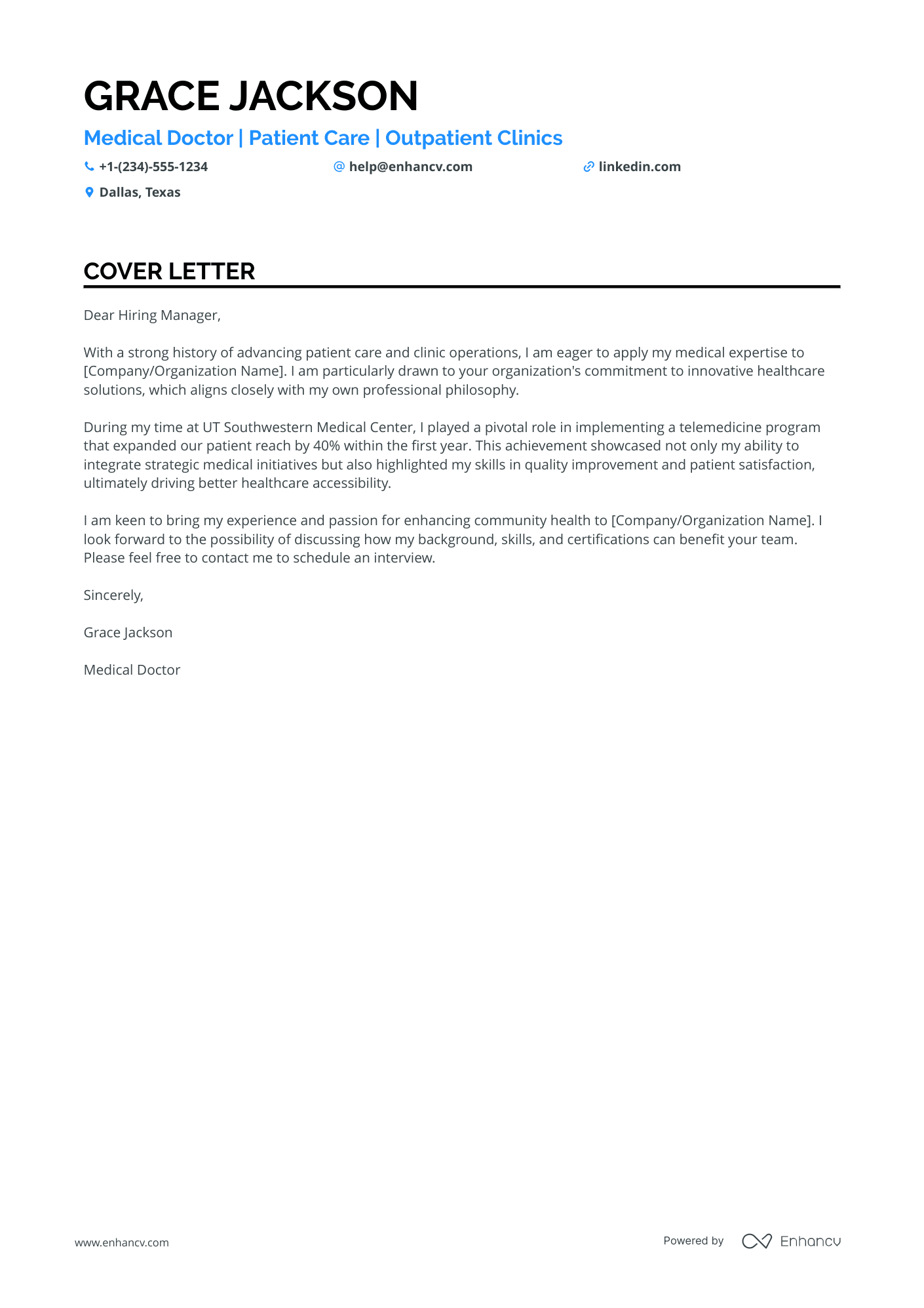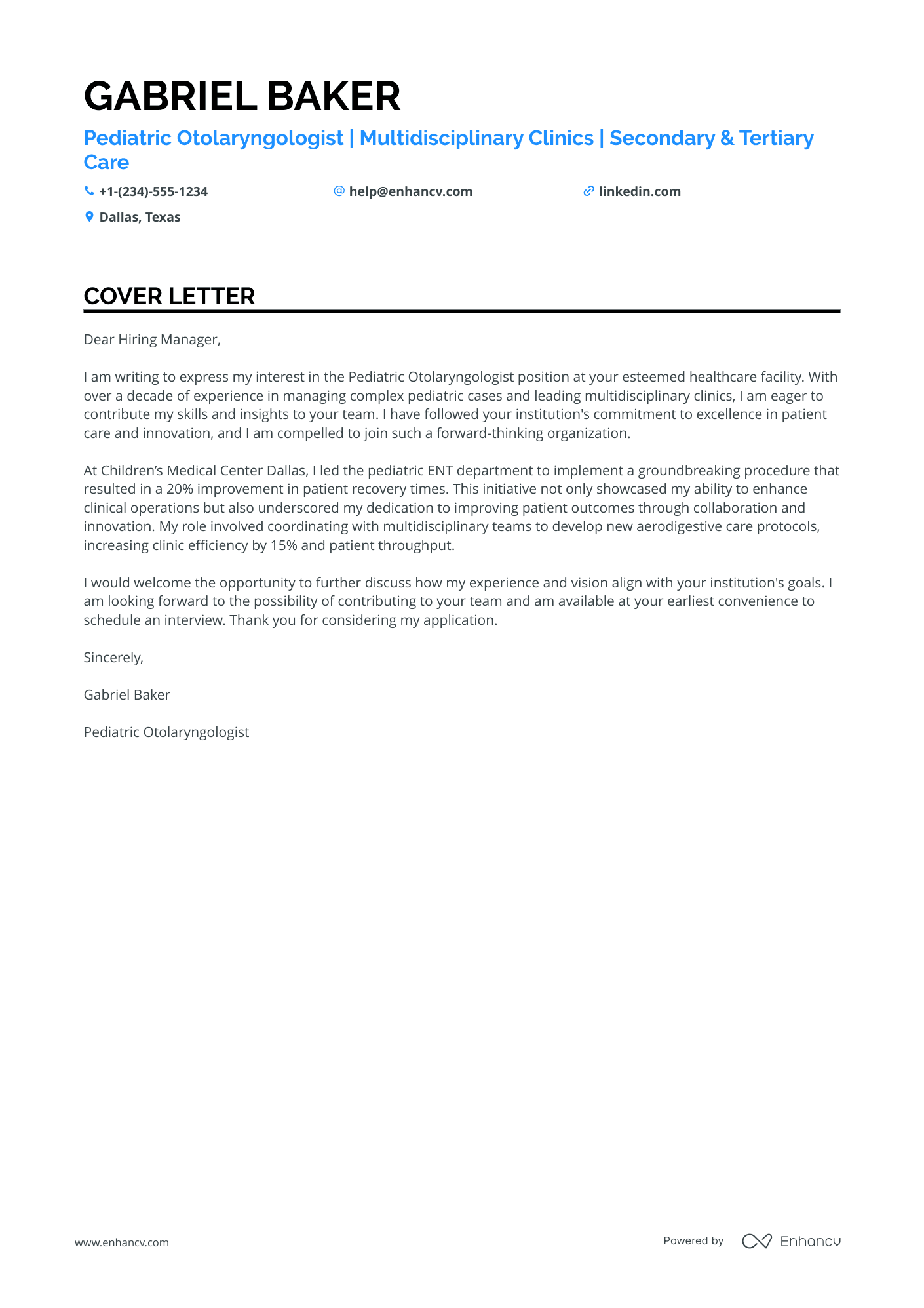Embarking on your job hunt, you've likely discovered that crafting a doctor cover letter is pivotal. However, this document can stump many with its purpose: not merely echoing your resume, but eloquently highlighting a professional pinnacle that defines you. Striking a balance between formality and freshness, while avoiding clichés, can be tough. Remember, brevity is key — your impactful narrative should captivate but never exceed one page. Let's navigate these challenges to ensure your cover letter stands out.
- Personalize your doctor cover letter and get inspired by other professionals to tell a compelling story;
- Format and design your doctor cover letter to make an excellent first impression;
- Introduce your best achievement in your doctor cover letter to recruiters;
- How to make sure recruiters get in touch with you, using your doctor cover letter greeting and closing paragraphs.
What is more, did you know that Enhancv's AI can write your cover letter for you? Just upload your doctor resume and get ready to forward your job application in a flash.
If the doctor isn't exactly the one you're looking for we have a plethora of cover letter examples for jobs like this one:
Drop your resume here or choose a file.
PDF & DOCX only. Max 2MB file size.
Doctor cover letter example
Lucas Rodriguez
Charlotte, NC
+1-(234)-555-1234
help@enhancv.com
- Emphasizing the alignment of personal practice with the institution's mission and innovative approaches enhances the relevance of the candidate's experience to the role.
- Providing concrete outcomes, such as the reduction in wait times by 20% and enhancing diagnostic accuracy by 15% through specific projects, showcases the candidate's impact and effectiveness in their past roles.
- Discussing the direct experience with relevant technologies, like telemedicine and AI diagnostics tools, positions the candidate as an individual who is adept at integrating technology within the healthcare field.
- Mentioning leadership in past initiatives indicates the ability to manage projects and drive innovation, which is valuable in a progressive healthcare institution.
What about your doctor cover letter format: organizing and structuring your information
Here is one secret you should know about your doctor cover letter assessment. The Applicant Tracker System (or ATS) won't analyze your cover letter.
You should thus focus on making an excellent impression on recruiters by writing consistent:
- Header
- Greeting
- Introduction
- Body paragraphs (and explanation)
- Promise or Call to action
- Signature (that's optional)
Now, let's talk about the design of your doctor cover letter.
Ensure all of your paragraphs are single-spaced and have a one-inch margins on all sides (like in our cover letter templates).
Also, our cover letter builder automatically takes care of the format and comes along with some of the most popular (and modern) fonts like Volkhov, Chivo, and Bitter.
Speaking of fonts, professionals advise you to keep your doctor cover letter and resume in the same typography and avoid the over-used Arial or Times New Roman.
When wondering whether you should submit your doctor cover letter in Doc or PDF, select the second, as PDF keeps all of your information and design consistent.
No time for a cover letter? Use our free cover letter generator and craft one effortlessly from your resume.
The top sections on a doctor cover letter
- Header with Contact Information: Include your name, address, phone number, and email so the recruiter can easily reach you, and add the date and the employer's contact information to show professionalism and attention to detail.
- Opening Greeting: Address the recruiter or hiring manager by name if possible, as personalization demonstrates that you’ve conducted research and are genuinely interested in the position at their healthcare facility.
- Introduction with Relevant Credentials: Begin with a strong opening statement that highlights your medical qualifications, years of experience, and special areas of expertise, which are crucial for making a strong first impression.
- Body of Experience and Skills: Elaborate on your clinical experiences, specialized training, and patient care philosophy, linking these to the requirements of the job to show you are a perfect fit for the role and understand the healthcare provider's needs.
- Closing and Call to Action: Conclude by reiterating your interest in the position, suggesting an in-person or virtual meeting, and thanking the reader for considering your application, which demonstrates your proactive approach and eagerness to contribute to their team.
Key qualities recruiters search for in a candidate’s cover letter
- Clinical proficiency and expertise: To ensure high-quality patient care and accurate diagnoses.
- Compassion and strong patient communication: For building trust and delivering care with empathy.
- Teamwork and collaboration skills: Vital for working effectively with healthcare teams and multi-disciplinary units.
- Resilience and stress management: To handle the high-pressure environments typical in healthcare settings.
- Leadership abilities: Important for managing healthcare staff and leading by example in various clinical scenarios.
- Commitment to continued education: To stay abreast of the latest medical research and technologies for optimal patient outcomes.
What greeting should you use in your doctor cover letter salutation
A simple "Hello" or "Hey" just won't work.
With your doctor cover letter salutation, you set the tone of the whole communication.
You should thus address the hiring managers by using their first (or last name) in your greeting.
But how do you find out who's recruiting for the role?
The easiest way is to look up the role on LinkedIn or the corporate website.
Alternatively, you could also contact the organization via social media or email, for more information.
Unable to still obtain the recruiter's name?
Don't go down the "To whom it may concern path". Instead, start your cover letter with a "Dear HR team".
List of salutations you can use
- Dear Dr. [Last Name],
- Dear Hiring Manager,
- Dear [Specific Title of the Receiver such as Director of Medical Staff Services],
- Dear Members of the [Department Name] Committee,
- Dear [Clinical Department] Search Committee,
- Dear [Hospital or Clinic Name] Recruiting Team,
The doctor cover letter intro: aligning your interest with the company culture
You only have one chance at making a memorable first impression on recruiters with your doctor cover letter.
Structure your introduction to be precise and to include no more than two sentences.
Here are some ideas on how to write a job-winning doctor cover letter introduction:
- get creative - show off your personality from the get-go (if this aligns with the company culture);
- focus on your motivation - be specific when you say what gets you excited about this opportunity.
What to write in the middle or body of your doctor cover letter
Here's where it gets tricky.
Your doctor cover letter body should present you in the best light possible and, at the same time, differ from your resume.
Don't be stuck in making up new things or copy-pasting from your resume. Instead, select just one achievement from your experience.
Use it to succinctly tell a story of the job-crucial skills and knowledge this taught you.
Your doctor cover letter is the magic card you need to further show how any organization or team would benefit from working with you.
Closing paragraph basics: choose between a promise and a call to action
You've done all the hard work - congratulations! You've almost reached the end of your doctor cover letter.
But how do you ensure recruiters, who have read your application this far, remember you?
Most doctor professionals end their cover letter with a promise - hinting at their potential and what they plan on achieving if they're hired.
Another option would be to include a call for follow-up, where you remind recruiters that you're very interested in the opportunity (and look forward to hearing from them, soon).
Choose to close your doctor cover letter in the way that best fits your personality.
Which story should you tell in your doctor cover letter when you have zero experience
Candidates, lacking professional experience in the field - this one is for you.
Your doctor cover letter is an exercise of integrity, honesty, and, above all, spinning a positive narrative around your strengths.
And what better way to capture recruiters' attention than with your most job-relevant achievement (this could be from your internship or volunteering experience)?
Make sure to back up your success with transferrable skills that are relevant to the job (e.g. how your year, studying abroad, has taught you to be more motivated and handle multicultural environments).
Another safe card you can bet on is your career dream: in the body of your doctor cover letter, go into the details of how your ambitions would help make the company you're applying for better.
Key takeaways
Within this Enhancv guide, we've provided you with plenty of advice and inspiration on writing your doctor cover letter:
- Always make sure your doctor cover letter is tailored to the role you're applying for to make a good impression on recruiters;
- In your doctor cover letter include a header (with your name, the role you're applying for, date, and contact details) and an introduction of up to two sentences that highlight your key accomplishment or why you'd fit the role;
- Focus your doctor cover letter body on one sole achievement through your career and all the valuable lessons, skills, and know-how you've learned (that are relevant to the role);
- Ensure your doctor cover letter closing statement isn't generic and includes either a call to action or a promise;
- If you lack professional experience, shift recruiters' focus to a relevant achievement (thanks to your academic or versatile experience) or toward your dreams and goals for professional growth.
Doctor cover letter examples
By Role
Family Medicine Doctor
- Emphasize specific achievements: Highlighting a quantifiable improvement such as the 20% increase in clinic efficiency demonstrates your ability to produce tangible results.
- Focus on relevant skills: Mentioning patient-centered care and healthcare cost management showcases expertise that is critical in a family medicine setting.
- Align personal and organizational values: Expressing enthusiasm for the organization's mission to provide comprehensive care illustrates a strong cultural fit.
- Offer to discuss further in an interview: Inviting the hiring manager to arrange an interview indicates readiness and eagerness to engage in further discussions.
Emergency Room Doctor
- Highlight relevant experience: Mention specific achievements and responsibilities from past roles, such as improving patient safety and client satisfaction, to demonstrate competence and effectiveness in a veterinary setting.
- Emphasize technical skills: Reference familiarity with veterinary equipment and electronic medical records (EMR) systems, which are crucial for the role.
- Showcase interpersonal skills: Discuss experiences with client interaction that led to high satisfaction rates, indicating strong communication and relationship-building abilities.
General Practitioner Doctor
- Emphasize any relevant experience that showcases successful implementation of healthcare initiatives, such as the telemedicine program example.
- Align personal professional philosophy with the organization's mission, demonstrating a strong fit and shared values with the potential employer.
- Highlight quantifiable achievements, such as expanding patient reach by a specific percentage, to illustrate the impact and results of past efforts.
- Express eagerness to contribute specific skills and experiences to the potential employer, offering to discuss how they can be beneficial through an interview.
Pediatric Doctor
- Showcase Relevant Experience: The letter highlights over a decade of experience in pediatric otolaryngology, demonstrating a deep understanding and capability in the field.
- Emphasize Achievements: The letter mentions the implementation of a groundbreaking procedure that improved patient recovery times by 20%, showcasing the applicant's ability to drive positive outcomes.
- Illustrate Leadership and Collaboration Skills: Leading the development of new care protocols with multidisciplinary teams indicates strong leadership and teamwork abilities, essential for a specialized medical role.
- Align with Organizational Values: The letter aligns the applicant's vision and track record with the institution's commitment to excellence and innovation, creating a strong cultural fit.













